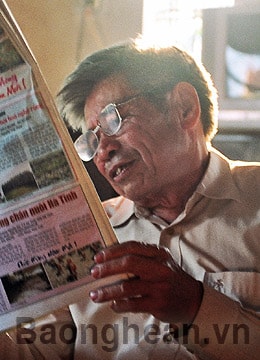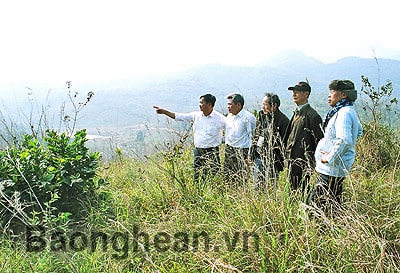Poet of "Bridge connecting happy shores"
In Nghe An, there are three poets whose literary careers are quite rich, but because each of them has a famous, outstanding poem that has moved and awakened an entire generation, becoming the spiritual heritage of the homeland even when the poet was still alive. That is the case of Tran Huu Thung with “Visiting the rice”, Minh Hue with “Tonight Uncle Ho does not sleep”, Phan Van Tu with “The bridge connecting the banks of joy”. In particular, the poem “The bridge connecting the banks of joy” by Phan Van Tu was composed into a song by musician Van An that has lasted through the years, becoming a traditional song of the heroic engineering troops.
(Baonghean) -In Nghe An, there are three poets whose literary careers are quite rich, but because each of them has a famous, outstanding poem that has moved and awakened an entire generation, becoming the spiritual heritage of the homeland even when the poet was still alive. That is the case of Tran Huu Thung with “Visiting the rice”, Minh Hue with “Tonight Uncle Ho does not sleep”, Phan Van Tu with “The bridge connecting the banks of joy”. In particular, the poem “The bridge connecting the banks of joy” by Phan Van Tu was composed into a song by musician Van An that has lasted through the years, becoming a traditional song of the heroic engineering troops.
Phan Van Tu was born in 1940, in Lien Tri village, Lien Thanh commune, Yen Thanh district. After finishing secondary school, Phan Van Tu took the entrance exam to the Commercial College and was sent to Yen Bai to purchase agricultural products to supply to commercial stores in the province. From Yen Bai, Phan Van Tu joined the army, crossed Truong Son to the southern battlefield, fought and wrote poetry to serve the army, then was assigned to the liberation army's literature and arts, lived and wrote with Nguyen Trong Oanh, Tran Ninh Ho, Hao Vu... After the Ho Chi Minh campaign ended, he returned to his hometown and worked as a literature and arts editor for Nghe An Radio. During his 25 years as a "midwife" and doing the kitchen work of an editor, he became a confidant, a trusted address for poetry commentators in and outside the province, to the point that when Phan Van Tu retired, it left a void that was difficult to fill.

Mr. Phan Van Tu Photo: HC
Phan Van Tu is a talented poet and his heart blends into his poetic ability. With a little natural talent combined with his natural ability in the process of both studying and composing, up to now, he has published 6 poetry collections, of which 4 have won the Nguyen Du and Ho Xuan Huong awards, and one has won the award of the Vietnam Union of Literature and Arts Associations. Normally, when people are passionate about poetry, they often neglect and delay their housework and other social work, but Phan Van Tu is not like that. He is passionate about composing, he stays up all night with the stacks of manuscripts from his friends, on Saturdays, Sundays, and vacations, he goes back to Lien Tri to plow the fields like an old farmer. He and his wife and children plow and harvest the 8 sao of contracted fields without hiring anyone, thanks to that, he has been able to raise 7 children, all of whom have received a thorough education, the youngest is about to graduate from university.
It is said that most poets are poor. So poor that someone jokingly said: "If you want thieves to not enter your house/ Write in front of the gate that this is a poet." Poets in the Central region, the land of Lao wind and white sand, are often poorer than the rest of the country. Phan Van Tu was both a poet and a journalist, with only a small salary to support 7 children. But Phan Van Tu overcame seemingly insurmountable difficulties to live honestly and nobly, making his colleagues and those around him admire him. Many colleagues asked Phan Van Tu to edit his poems, many agencies and units asked Phan Van Tu to write historical books and yearbooks. In his retirement years, Phan Van Tu helped Yen Thanh district edit and print Yen Thanh internal magazine. He and a number of fellow poets also meticulously collected manuscripts and posthumous works of deceased poet friends such as Bien Ho, Tran Xuan Ky, Ngoc Cuong, etc. to print. When doing these things, Phan Van Tu never asked for any money or material things. He just silently wrote, read, and walked like a diligent bee.

Mr. Phan Van Tu (2nd left) is on a field trip.
at Youth Volunteer Team 6 (Yen Thanh). Photo: Ho Cac
When he was still at Nghe An Radio and Television Station, his friends in the South and the North encouraged him to apply to join the Vietnam Writers Association and the Party, but he just smiled silently. Perhaps few people thought that Phan Van Tu was not a member of the Vietnam Writers Association or a Party member, but that was the truth. It was not that he had any problems with his background, but simply because he did not apply. Many people say that good people are often stubborn. However, when he wrote poems about the Party and Uncle Ho, his moments of sublimation were no less than when he wrote love poems. On the 120th anniversary of the birth of revolutionary Phan Dang Luu, his poem was solemnly printed on the front page of the Party newspaper: "With two kinds of hair on my head, I am not a Party member yet".
Phan Van Tu's poetry and poetic personality will continue to be an open topic for many treatises, because many people have been and will continue to be fascinated, haunted, and the more they read, the more interesting they find it.
Ngo Duc Tien






